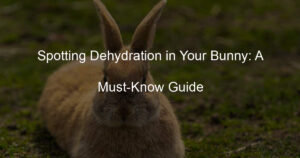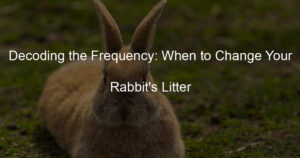
Understanding Rabbit Health: A Beginner’s Guide
Keeping your rabbit healthy is crucial for their happiness and longevity. This guide will help you understand the basics of rabbit health, from recognizing healthy behaviors to understanding common health issues and the importance of regular vet check-ups.
-
Recognizing Healthy Rabbit Behaviors
Rabbits are active and social animals. Healthy behaviors include eating and drinking regularly, hopping around, and showing interest in their surroundings. They should also have a shiny coat and clear, bright eyes. If your rabbit is hiding, not eating, or seems lethargic, it could be a sign of illness.
-
Understanding Common Rabbit Health Issues
Rabbits can suffer from a variety of health issues. Some of the most common include dental disease, digestive problems, and respiratory infections. It’s important to be aware of these issues and their symptoms so you can seek veterinary care promptly if needed. For example, if your rabbit stops eating, it could be a sign of dental disease or a digestive issue.
-
Importance of Regular Vet Check-ups
Regular vet check-ups are essential for keeping your rabbit healthy. A vet can spot early signs of illness and provide treatment before the condition worsens. They can also provide advice on diet, exercise, and other aspects of rabbit care. It’s recommended to take your rabbit for a check-up at least once a year, or more often if they are older or have health issues.
In conclusion, understanding rabbit health is not complicated, but it does require vigilance and commitment. By recognizing healthy behaviors, being aware of common health issues, and ensuring regular vet check-ups, you can help your rabbit live a long, happy life.
| Healthy Behaviors | Common Health Issues | Vet Check-ups |
|---|---|---|
| Eating and drinking regularly, active, shiny coat, clear eyes | Dental disease, digestive problems, respiratory infections | At least once a year, more often for older rabbits or those with health issues |
Basic Rabbit Care: Essential Rabbit Care Tips
When it comes to caring for your pet rabbit, understanding their dietary needs is crucial. The right diet not only ensures their health but also contributes to their overall well-being. In this section, we will delve into the essential aspects of a rabbit’s diet and nutrition.
Diet and Nutrition
Just like humans, rabbits have specific dietary needs that need to be met for them to thrive. Here are some key points to consider:
- Understanding a rabbit’s dietary needs
- Choosing the right rabbit food
- The role of hay in a rabbit’s diet
Rabbits are herbivores, meaning they eat plants. Their diet should consist of 70% hay, with the rest being a mix of fresh vegetables, fruits, and high-quality rabbit pellets. Rabbits also need constant access to fresh, clean water.
When choosing food for your rabbit, look for high-quality rabbit pellets. These should be given in small amounts as they are quite rich. Fresh vegetables like broccoli, spinach, and bell peppers are also great for rabbits. Fruits can be given as treats, but in moderation due to their high sugar content.
Hay plays a crucial role in a rabbit’s diet. It provides the necessary fiber for a healthy digestive system and helps grind down their constantly growing teeth. Timothy hay, orchard grass, and meadow hay are all excellent choices for your rabbit.
Remember, a balanced diet is key to your rabbit’s health. By understanding their dietary needs and providing the right food, you can ensure your bunny stays happy and healthy.
| Rabbit’s Diet | Percentage |
|---|---|
| Hay | 70% |
| Fresh Vegetables | 20% |
| Rabbit Pellets | 5% |
| Fruits (as treats) | 5% |
Environment and Housing
Creating a safe and comfortable environment for your rabbit is crucial for their health and happiness. This section will guide you through the process of setting up the perfect home for your bunny.
- Creating a Safe and Comfortable Living Space
- The Importance of Exercise and Play
- Understanding the Dangers of Heat and Cold
Your rabbit’s living space should be a safe haven where they can eat, sleep, and play without any worries. It should be spacious enough for them to move around freely. A cage or hutch with a solid floor is recommended, as wire floors can hurt their feet. Make sure to fill the cage with plenty of soft bedding for comfort. Also, it’s important to keep the cage clean to prevent diseases.
Rabbits are active creatures that require regular exercise and playtime. Without it, they can become bored and depressed. Provide your rabbit with toys and activities to keep them entertained. This can be as simple as a cardboard box to explore or a ball to push around. Remember, a happy rabbit is a healthy rabbit!
Rabbits are sensitive to extreme temperatures. In the summer, they can suffer from heatstroke if left in a hot environment. In the winter, they can get hypothermia if they’re too cold. It’s important to keep your rabbit’s living space at a comfortable temperature, ideally between 60 and 70 degrees Fahrenheit. Always provide fresh water and shade in hot weather, and warm bedding in cold weather.
| Key Points | Details |
|---|---|
| Safe Living Space | Spacious cage with a solid floor and soft bedding. Keep it clean. |
| Exercise and Play | Provide toys and activities for mental and physical stimulation. |
| Temperature Control | Keep the living space between 60 and 70 degrees Fahrenheit. Provide fresh water and shade in hot weather, and warm bedding in cold weather. |
First Aid for Rabbits: A Practical Guide
As a rabbit owner, it’s crucial to be prepared for any health emergencies that may arise. This guide will help you understand how to prepare a first aid kit specifically for your furry friend.
Preparing a Rabbit First Aid Kit
Having a well-stocked first aid kit is the first step towards ensuring your rabbit’s health and safety. Let’s take a look at the essential items you should have in your kit.
- Essential items for a rabbit first aid kit
- Antiseptic wipes: For cleaning wounds.
- Bandages: To cover wounds and prevent infection.
- Styptic powder: To stop bleeding from minor cuts or nail trims.
- Saline solution: For cleaning eyes and wounds.
- Thermometer: To check your rabbit’s temperature.
- Small scissors: For cutting bandages or fur.
- Tweezers: To remove foreign objects from wounds.
- Keeping the first aid kit updated
Here are some items you should always have in your rabbit’s first aid kit:
It’s not enough to just have a first aid kit; you need to keep it updated. Check your kit regularly to ensure all items are in good condition and haven’t expired. Replace any used or outdated items immediately. Remember, a well-stocked first aid kit can make a big difference in an emergency.
Preparing a first aid kit for your rabbit is a proactive step towards ensuring their health and well-being. Remember, while a first aid kit is essential, it’s not a substitute for professional veterinary care. Always consult with a vet if your rabbit is injured or ill.
Handling Common Rabbit Health Issues
As a rabbit owner, it’s crucial to understand how to handle common health issues that your furry friend may encounter. This knowledge will help you provide the best care possible for your pet.
- Dealing with minor injuries
- Recognizing and responding to signs of illness
- When to seek professional help
Rabbits can sometimes get minor injuries like cuts or scratches. When this happens, it’s important to clean the wound with warm water and a mild soap. After cleaning, apply a pet-safe antiseptic to prevent infection. Always remember to handle your rabbit gently to avoid causing additional stress or pain.
Rabbits are good at hiding their pain, so it’s essential to know the signs of illness. These can include changes in eating habits, unusual behavior, or a dull coat. If you notice any of these signs, it’s important to respond quickly. Provide a quiet and comfortable space for your rabbit and monitor their condition closely.
While it’s important to know how to handle minor issues, it’s equally crucial to know when to seek professional help. If your rabbit’s condition doesn’t improve or worsens, it’s time to consult a vet. Other signs that require immediate professional help include severe injuries, sudden weight loss, or difficulty breathing.
In conclusion, understanding how to handle common rabbit health issues can make a big difference in your pet’s wellbeing. Remember, the key is to observe your rabbit closely, respond quickly to signs of illness, and know when to seek professional help.
Rabbit Health Tips: Keeping Your Bunny Healthy
Ensuring the health and happiness of your rabbit is a top priority. Here are some essential preventive care tips to keep your bunny bouncing with joy.
Preventive Care for Rabbits
Preventive care is the best way to ensure your rabbit stays healthy. It involves regular grooming, dental care, and vaccinations. Let’s delve into each of these aspects.
- Regular grooming and its benefits
- The importance of dental care in rabbits
- Vaccinations and their role in rabbit health
Grooming is not just about keeping your rabbit looking good, it’s also about their health. Regular grooming helps to remove loose fur that your rabbit might ingest while cleaning themselves. This can prevent issues like hairballs and gastrointestinal blockages. Additionally, grooming gives you a chance to check for any skin issues or abnormalities.
Rabbits have unique dental needs. Their teeth grow continuously throughout their lives, and if they don’t wear down properly, it can lead to serious health issues. Providing your rabbit with plenty of hay and chew toys can help keep their teeth in check. Regular dental check-ups with a vet are also crucial to spot any potential problems early.
Vaccinations play a vital role in protecting your rabbit from serious diseases. Rabbits should be vaccinated against diseases like Myxomatosis and Rabbit Viral Haemorrhagic Disease (RVHD). Always consult with your vet to ensure your rabbit’s vaccinations are up to date.
In conclusion, preventive care for rabbits involves regular grooming, dental care, and vaccinations. By following these tips, you can help ensure your bunny stays healthy and happy.
Understanding Rabbit Behavior
Understanding your rabbit’s behavior is crucial to maintaining their health and happiness. Rabbits, like all animals, have their own unique ways of communicating. Let’s explore some common rabbit behaviors, signs of stress or discomfort, and how to handle a scared or aggressive rabbit.
- Interpreting Common Rabbit Behaviors
- Recognizing Signs of Stress or Discomfort
- How to Handle a Scared or Aggressive Rabbit
Rabbits express themselves in a variety of ways. For example, a happy rabbit might perform a ‘binky’, which is a joyful jump and twist in the air. If your rabbit is thumping its hind legs, it could be a sign of fear or warning. A rabbit that is grinding its teeth loudly is likely in pain and needs immediate attention.
It’s important to recognize when your rabbit is stressed or uncomfortable. Signs of stress can include changes in eating or bathroom habits, excessive grooming, or hiding. If your rabbit is hunched over or grinding its teeth, it could be in discomfort. Always consult a vet if you’re unsure.
Handling a scared or aggressive rabbit requires patience and understanding. Never force interaction. Instead, spend time near your rabbit without touching them to build trust. If your rabbit is aggressive, it’s important to identify and remove any stressors. Consult a vet or rabbit behaviorist for advice.
| Behavior | Meaning |
|---|---|
| Binky | Happy, excited |
| Thumping | Fear, warning |
| Teeth grinding | Pain, discomfort |
Remember, every rabbit is unique and may express themselves differently. Always observe your rabbit’s behavior and consult a professional if you’re unsure.
Caring for a Rabbit: Beyond the Basics
As a rabbit owner, it’s important to understand that your pet’s needs will change as they age or if they become ill. Here, we delve into advanced rabbit care, focusing on senior rabbits, those with chronic illnesses, and dealing with the loss of a rabbit.
Advanced Rabbit Care
- Understanding the special needs of senior rabbits
- Caring for a rabbit with a chronic illness
- Dealing with the loss of a rabbit
As rabbits age, they may require more specialized care. Senior rabbits often have a slower metabolism and may struggle with weight gain or loss. They may also be more prone to certain health issues, such as arthritis or dental problems. Regular vet check-ups are crucial to monitor their health and catch any potential issues early.
Rabbits with chronic illnesses, such as gastrointestinal stasis or respiratory diseases, require extra attention. They may need medication, special diets, or additional vet visits. It’s important to monitor their behavior and eating habits closely, as changes can signal a flare-up of their illness.
Losing a pet is never easy. It’s important to allow yourself time to grieve and remember the good times you had with your rabbit. Consider creating a memory box with photos and favorite toys, or planting a tree in their honor. Remember, it’s okay to seek support from others who understand your loss.
In conclusion, advanced rabbit care involves understanding and meeting the unique needs of your pet as they age or battle chronic illnesses. The loss of a rabbit is a difficult experience, but remember, it’s okay to grieve and seek support. Your love and care can make a significant difference in your rabbit’s quality of life.
Resources for Rabbit Owners
When it comes to caring for your rabbit, having the right resources at your disposal can make all the difference. Here are some key resources that every rabbit owner should be aware of:
-
Recommended Books and Websites for Rabbit Care
There are many excellent books and websites out there that can provide you with a wealth of information on rabbit care. Some recommended books include “The House Rabbit Handbook” by Marinell Harriman and “Rabbits for Dummies” by Connie Isbell. Websites like the House Rabbit Society and Rabbit Care Tips are also great resources for learning about rabbit health, behavior, and care.
-
Finding a Rabbit-Savvy Vet
Not all vets are experienced in dealing with rabbits, so it’s important to find one who is. Ask for recommendations from other rabbit owners or from local rabbit rescue organizations. Remember, a good rabbit vet will not only be knowledgeable about rabbit health, but also patient and compassionate in their care.
-
Joining a Local or Online Rabbit Community
Joining a local or online rabbit community can provide you with a network of support and a wealth of shared knowledge. Local rabbit clubs often hold meetings and events, while online communities like the BinkyBunny Forum and the Rabbits subreddit can provide advice and support at any time of day or night.
By taking advantage of these resources, you can ensure that you’re providing the best possible care for your rabbit.




